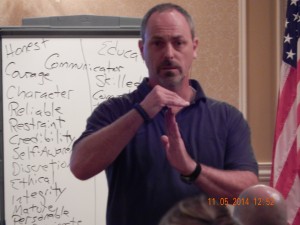Years ago (1999) I wrote the Ten Virtues of a Law Officer which is a character-based code of ethics for law enforcement professionals — not meant to supplant other codes of ethics that are out there, but to approach it from a different perspective consistent with the message of Police Dynamics. Here, in my first video post from the US Embassy in Kabul, Afghanistan and just a week after the attack of September 13 (warning – graphic photos), I offer an introduction to the Ten Virtues.
Over the next several weeks, I plan to post a video training clip on each of the virtues as a guide for law enforcement professionals (Please forgive the quality of the video. I am still experimenting with the video settings on my camera to deal with the poor lighting in my hooch)…
The Ten Virtues start with:
As a member of the law enforcement profession, I pledge to honor the sacred trust placed in me by God and the community I serve by guarding the thoughts and attitudes of my heart as I purpose to:
In a religious context, the definition of profession means an act of taking vows or declaring an oath. In a secular context, profession means a calling that requires specialized knowledge or credentials. In other words, to be considered a profession there must be a Professional Body of Knowledge, a Professional Body of Ethics, and a Professional Body of Standards that are enforced by a regulatory agency such as a POST, Police Officer Standards and Training, Board.
Law enforcement is a profession in every sense of the word (except for one). We have a Professional Body of Knowledge, a Professional Code of Ethics, and Professional Standards that are enforced by a regulatory agency. We just don’t get PAID as professionals…!
According to Romans Chapter 13, law enforcement is a “ministry of God.” When a law officer takes the oath of office and says “so help me God” it’s got to mean something. If you don’t believe there IS a God, if you don’t believe there is a Supreme Being to whom we are held accountable for how we conduct ourselves in the is life and how we administer the authority that has been entrusted to us, then those words don’t mean very much, do they? A minister is simply one who serves. As a law officer, you have been called into the ministry of law enforcement. And you have been entrusted with a tremendous amount of authority from the citizens you serve. It really IS a sacred trust.
As a law officer you have power and authority to take away at least four things. Under the right circumstances you have the power to take away life, to take away property, to take away freedom, and to take away children. No one else in our society has that kind of authority. “He who has been given a trust must prove himself faithful.” That is the essential message of the Tarnished Badge.
It all starts with our heart – our motivation. The three root character flaws – anger, lust, and greed – originate there. It’s so important for us to guard the thoughts and attitudes of our hearts. So as a professional law officer – one who has been called into the ministry of law enforcement, one who is truly faithful, one who is true to the oath of office, one who is true to the authority entrusted to him – we MUST purpose to do certain things. These are the Ten Virtues.
I use the word purpose because it means we will not do it perfectly. Understanding our own frailties, shortcomings, and character flaws, we are all works in progress. But we must endeavor to do these things. We must endeavor to live a life of character and faithfulness. That’s what the Ten Virtues are all about: endeavoring to honor the badge, endeavoring to honor the trust, keeping our egos and evil desires in check. So we can be the professional law officers we have been called to be…

